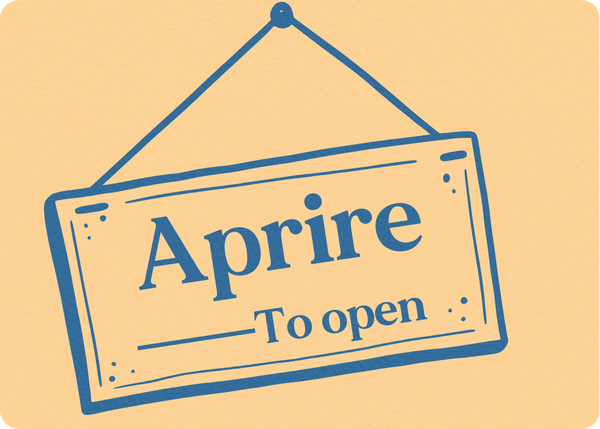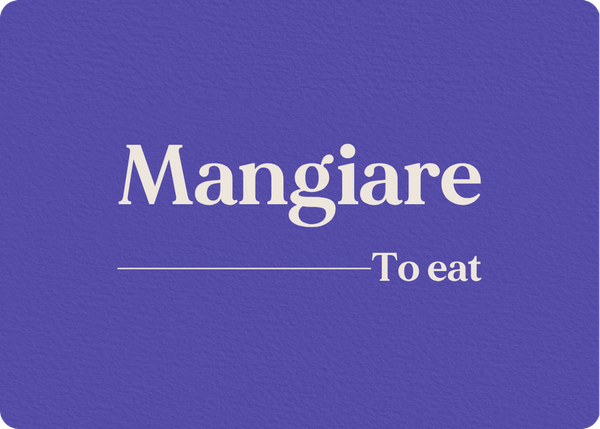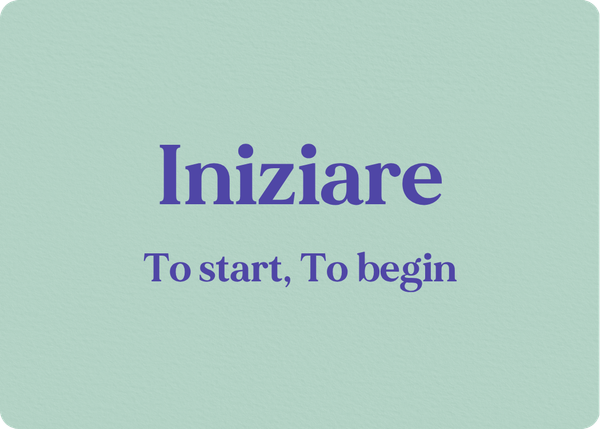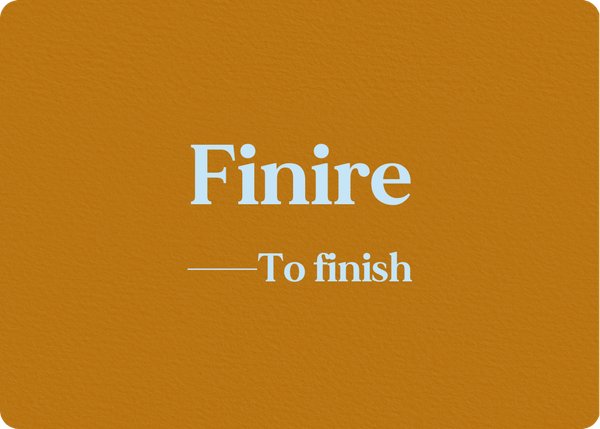What is Aprire?
Aprire is an Italian verb meaning "to open". It belongs to the third conjugation (-IRE verbs), but presents some irregularities. This verb is useful for expressing opening doors and windows, starting businesses, and conveying emotions.
Key Features of Aprire:
- Type: Irregular third conjugation verb (-IRE)
- Meaning: To open, to unlock
- Irregularities: Simple past (aprii, etc.), past participle (aperto)
- Auxiliary verb: Uses "avere" (to have) for conjugation in compound tenses
- Past participle: Aperto
Indicativo – Indicative Mood
Presente (Present Tense)
| Person | Conjugation |
|---|---|
| io | apro |
| tu | apri |
| lui/lei | apre |
| noi | apriamo |
| voi | aprite |
| loro | aprono |
Example:
Ogni mattina apro tutte le finestre.
Every morning I open all the windows.
Passato Prossimo (Present Perfect)
| Person | Conjugation |
|---|---|
| io | ho aperto |
| tu | hai aperto |
| lui/lei | ha aperto |
| noi | abbiamo aperto |
| voi | avete aperto |
| loro | hanno aperto |
Example:
Francesca ha aperto un nuovo negozio in centro.
Francesca has opened a new shop downtown.
Imperfetto (Imperfect)
| Person | Conjugation |
|---|---|
| io | aprivo |
| tu | aprivi |
| lui/lei | apriva |
| noi | aprivamo |
| voi | aprivate |
| loro | aprivano |
Example:
Da bambino aprivo sempre i regali prima di Natale.
As a child, I always used to open presents before Christmas.
Trapassato Prossimo (Past Perfect)
| Person | Conjugation |
|---|---|
| io | avevo aperto |
| tu | avevi aperto |
| lui/lei | aveva aperto |
| noi | avevamo aperto |
| voi | avevate aperto |
| loro | avevano aperto |
Example:
Al mattino ci siamo accorti che qualcuno aveva aperto il cancello durante la notte.
In the morning we realized that someone had opened the gate during the night.
Passato Remoto (Simple Past)
| Person | Conjugation |
|---|---|
| io | aprii/apersi |
| tu | apristi |
| lui/lei | aprì/aperse |
| noi | aprimmo |
| voi | apriste |
| loro | aprirono/apersero |
Example:
Andrea aprì il libro e cominciò a leggere ad alta voce.
Andrea opened the book and began to read aloud.
Trapassato Remoto (Past Anterior)
| Person | Conjugation |
|---|---|
| io | ebbi aperto |
| tu | avesti aperto |
| lui/lei | ebbe aperto |
| noi | avemmo aperto |
| voi | aveste aperto |
| loro | ebbero aperto |
Example:
Dopo che ebbe aperto il messaggio, sorrise.
After he had opened the message, he smiled.
Futuro Semplice (Simple Future)
| Person | Conjugation |
|---|---|
| io | aprirò |
| tu | aprirai |
| lui/lei | aprirà |
| noi | apriremo |
| voi | aprirete |
| loro | apriranno |
Example:
Domani apriremo il nuovo ufficio.
Tomorrow we will open the new office.
Futuro Anteriore (Future Perfect)
| Person | Conjugation |
|---|---|
| io | avrò aperto |
| tu | avrai aperto |
| lui/lei | avrà aperto |
| noi | avremo aperto |
| voi | avrete aperto |
| loro | avranno aperto |
Example:
Quando avrò aperto la lettera, ti dirò cosa c'è scritto.
When I’ve opened the letter, I’ll tell you what it says.
Congiuntivo – Subjunctive Mood
Presente (Present Subjunctive)
| Person | Conjugation |
|---|---|
| che io | apra |
| che tu | apra |
| che lui/lei | apra |
| che noi | apriamo |
| che voi | apriate |
| che loro | aprano |
Example:
Spero che la banca apra un nuovo sportello nella nostra città.
I hope the bank opens a new branch in our city.
Passato (Past Subjunctive)
| Person | Conjugation |
|---|---|
| che io | abbia aperto |
| che tu | abbia aperto |
| che lui/lei | abbia aperto |
| che noi | abbiamo aperto |
| che voi | abbiate aperto |
| che loro | abbiano aperto |
Example:
Penso che il museo abbia già aperto.
I think the museum has already opened.
Imperfetto (Imperfect Subjunctive)
| Person | Conjugation |
|---|---|
| che io | aprissi |
| che tu | aprissi |
| che lui/lei | aprisse |
| che noi | aprissimo |
| che voi | apriste |
| che loro | aprissero |
Example:
Non credevo che Marco aprisse la porta senza bussare.
I didn't think Marco would open the door without knocking.
Trapassato (Past Perfect Subjunctive)
| Person | Conjugation |
|---|---|
| che io | avessi aperto |
| che tu | avessi aperto |
| che lui/lei | avesse aperto |
| che noi | avessimo aperto |
| che voi | aveste aperto |
| che loro | avessero aperto |
Example:
Se io avessi aperto l’ombrello prima, non mi sarei bagnato.
If I had opened the umbrella earlier, I wouldn't have gotten wet.
Condizionale – Conditional Mood
Presente (Present Conditional)
| Person | Conjugation |
|---|---|
| io | aprirei |
| tu | apriresti |
| lui/lei | aprirebbe |
| noi | apriremmo |
| voi | aprireste |
| loro | aprirebbero |
Example:
Apriremmo un dibattito sulla questione, ma non è il momento.
We’d start a discussion on the matter, but it’s not the right time.
Passato (Past Conditional)
| Person | Conjugation |
|---|---|
| io | avrei aperto |
| tu | avresti aperto |
| lui/lei | avrebbe aperto |
| noi | avremmo aperto |
| voi | avreste aperto |
| loro | avrebbero aperto |
Example:
Avrei aperto prima il cancello se avessi saputo del tuo arrivo!
I would have opened the gate earlier if I had known about your arrival!
Imperativo (Imperative)
| Person | Conjugation |
|---|---|
| (tu) | apri |
| (lui/lei) | apra |
| (noi) | apriamo |
| (voi) | aprite |
| (loro) | aprano |
Example:
Apri la finestra, fa troppo caldo!
Open the window, it's too hot!
Indefinite Moods
Infinito (Infinitive)
- Presente (Present): aprire (to open)
- Passato (Past): avere aperto (to have opened)
Examples:
Ho deciso di aprire un blog di cucina!
I decided to open a cooking blog!
Sono felice di aver(e) aperto un nuovo capitolo della mia vita.
I'm happy to have opened a new chapter in my life.
Participio (Participle)
- Passato (Past): aperto (opened)
Examples:
I dirigenti hanno aperto la riunione con un minuto di silenzio.
The executives opened the meeting with a minute of silence.
Gerundio (Gerund)
- Presente (Present): aprendo (opening)
- Passato (Past): avendo aperto (having opened)
Examples:
Aprendo quella scatola, ho trovato tante vecchie foto.
By opening that box, I found a lot of old photos.
Avendo aperto il suo cuore, ricevette comprensione.
Having opened her heart, she received understanding.
The verb Aprire at a glance: Key tenses you need
| Present | Present Perfect | Imperfect | Present Subjunctive | Imperfect Subjunctive | Present Conditional |
|---|---|---|---|---|---|
| io apro | io ho aperto | io aprivo | che io apra | che io aprissi | io aprirei |
| tu apri | tu hai aperto | tu aprivi | che tu apra | che tu aprissi | tu apriresti |
| lui/lei apre | lui/lei ha aperto | lui/lei apriva | che lui/lei apra | che lui/lei aprisse | lui/lei aprirebbe |
| noi apriamo | noi abbiamo aperto | noi aprivamo | che noi apriamo | che noi aprissimo | noi apriremmo |
| voi aprite | voi avete aperto | voi aprivate | che voi apriate | che voi apriste | voi aprireste |
| loro aprono | loro hanno aperto | loro aprivano | che loro aprano | che loro aprissero | loro aprirebbero |
Conclusion
Mastering the conjugation of "aprire" is useful for expressing opening, starting, and beginning actions in Italian. This irregular third conjugation verb requires attention to its unique forms.
Remember the key points:
- Uses "avere" as auxiliary verb in compound tenses
- Past participle is "aperto"
- Irregular in simple past and past participle
- Essential for expressing physical opening (doors, windows) and abstract opening (businesses, hearts, minds)
Keep practicing with real sentences and contextual examples to master this Italian verb!





